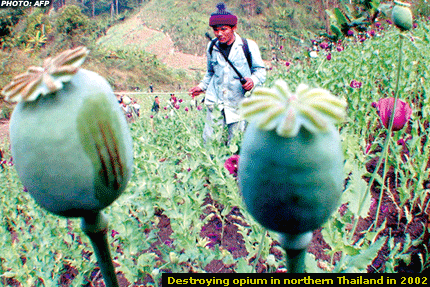
| By MICHAEL BLACK AND ROLAND FIELDS | APRIL, 2006 - VOLUME 14 NO.4 |
Thai opium crop substitution program in
A Thai project under royal patronage to wean farmers in Burma's Shan State away from opium production is encountering problems because of political changes in Rangoon.

Since the fall of prime minister and military intelligence chief Gen Khin Nyunt, staff of the Mae Fah Luang Foundation in northern Thailand have been denied direct access to the project, known as Doi Tung 2, established at Yong Kha in southeastern Shan State. Project staff say the four-year-old crop substitution project is still functioning, but with local supervision.
Yong Kha is administered by Bao Yuxiang’s United Wa State Army, and well-informed sources confirm that two battalions of the 171st Division UWSA-South have recently taken up positions there.
The presence of Wa troops in the area of the Yong Kha project leaves the Mae Fah Luang Foundation in something of a quandary. DT2’s accomplishments could be seen to inadvertently lend legitimacy to the UWSA, one of the world’s largest narco-militias. The UWSA could conceivably hijack DT2’s success story, using it to demonstrate they are indeed intent on kicking old habits.
The success of DT2 should be assured if it follows the successful formula adopted by the first Doi Tung development project, DT1, the crop substitution and community development initiative launched by the Mae Fah Luang Foundation on Doi Tung, an upland area of
DT1 is not only a crop-substitution program but, in the words of Thai Foreign Minister Kantathi Suphamongkhon, “provides alternative employment opportunities, vocational training, education and health services...and the promotion of self-sufficiency.” It’s credited with weaning more than 11,000 hill tribe villagers away from poppy cultivation and increasing their incomes eightfold.
The alternative crops grown by the hill tribe farmers—coffee, tea, macadamia nuts, rare fruits—“have been a big hit among the urban middle class,” says Foreign Minister Kantathi.
Using the DT2 model, the Mae Fah Luang Foundation has now embarked on a crop-substitution program in
After showing impressive statistical evidence of opium reduction in
Poppy growers in
The challenge in
Compounding DT3’s challenge are the huge security risks involved.